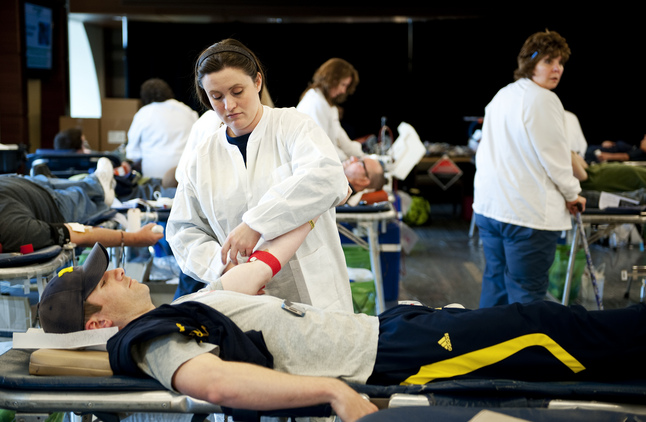Hiring outlook for nursing grads in Michigan remains positive, experts say

Registered nurses will likely be in high demand in Michigan in the next five to ten years as a wave of nurses who put off ending their careers because of the poor economy decide to retire.
Daniel J. Brenner | AnnArbor.com file photo
Though the economic recession slightly changed the hiring trends for health care providers, the job sector continued to grow as Michigan’s manufacturing economy shrank in the past five years.
It’s a different and decisively more positive outlook than other markets in the U.S., where 43 percent of newly licensed registered nurses can’t find a job within the first 18 months of graduating, according to a recent report.
“The employment picture has certainly gotten brighter here in Michigan, as the economy has gotten better and people have gone back to work,” said Carole Stacy, director of the Michigan Center for Nursing.
The University of Michigan Health System's online job portal shows 42 open positions for nurses, and there are 95 positions available for nursing professionals in St. Joseph Mercy Health system's Ann Arbor, Saline and Livingston locations.
About a year and a half ago, it would take some recently graduated nurses about three to four months to find their first job, Stacy said.
“Our students are getting jobs within six months,” said Michael Williams, interim director of the School of Nursing at Eastern Michigan University. “It has definitely taken longer than five to 10 years ago when they were hired six months before they graduated.”
That’s about to change.
The economic slump meant many older nurses - a field predominated by women - continued to work instead of retire, meaning the field of positions that would have been traditionally vacated was much less open to new hires.

Data from the Michigan Center for Nursing Survey of Nurses 2011 that shows the age of practicing registered nurses in Southeast Michigan.
Courtesy Michigan Center for Nursing
Hiring trends in the field are changing as well.
Employers are giving preference to registered nurse candidates who have a bachelor’s degree over an associate degree, Stacy said.
“There’s a real push on now for nurses to continue their education,” she said.
There’s no clear pay distinction between registered nurses with a four-year degree and a two-year degree, Stacy said, noting most employers don’t compensate nurses for the higher degree.
Nationwide, enrollment in Bachelor of Science in Nursing (BSN) programs has increased every year for the past nine years: In 2003, enrollment was at 31,215 students and in 2011 enrollment was at 89,975 students, according to the American Association of Colleges of Nursing.
Stacy said patient satisfaction and patient outcomes markedly improve when more nurses are prepared at a BSN level.
In Michigan, about 60 percent of recently graduated registered nurses have associate degrees while 40 percent have bachelor’s degrees, Stacy said.
“There’s no way to flip it with the system we have,” Stacy said, noting about 17 percent of graduates from two-year programs continue on to get their bachelor’s degree.

Carole Stacy
Courtesy Michigan Center for Nursing
By 2006, 10,000 nurses graduated from programs and were licensed, Stacy said.
There continues to be a high demand among students for nursing program spots.
At EMU, 112 out of about 300 applicants were selected for the program this year, Williams said.
Washtenaw Community College has a wait list for its nursing program, and graduated 68 students with associate degrees in 2012. Additionally, 18 students from its transfer program graduated with four-year nursing degrees.
Classes of 40 students each are admitted to WCC’s nursing program each fall and winter semester.
Stacy said experts are still predicting nursing shortages in the future - the extent of which will be determined by the impending windfall of retirements set to hit the sector.
Newly licensed nurses may also likely find their first job in a specialty of nursing that is not their first preference, Stacy said.
“Many of them were not able to find a job in acute care settings, but they could find jobs in long-term care or home health care … there were jobs out there,” Stacy said. “Some experienced not being able to get a full-time job, but they could get a per diem, on-call contingency position.”
Though most registered nurses would prefer to work day shifts in a pediatric setting, Stacy said there are more openings in other areas.
Long-term care facilities are hiring more registered nurses than licensed practice nurses because the patients are increasingly sicker than they have been in previous years, requiring more specialized care, Stacy said.
Hospitals are also directly hiring more per diem nurse employees than in years past, Stacy said.
“We’re hearing that some of these new hires are being hired on as per diem and contingency workers,” Stacy said. “They may or may not get benefits; it’s a little bit tenuous on job security.”
Two decades ago, there was a large market for private agencies hiring temporary employees with whom hospitals would contract to provide them with a pool of nurses. Now, many hospitals are choosing to hire those employees directly, Stacy said.
Starting salaries for registered nurses have not changed in the past three to four years, and entry-level registered nurses make about $50,000 to $55,000, Stacy said.
According to the U.S. Department of Labor Bureau of Labor Statistics, the average mean wage in 2011 for registered nurses was $69,110. The job outlook between 2010 and 2020 is expected to grow by 26 percent, which is faster than the average growth outlook of 14 percent.
Amy Biolchini covers Washtenaw County, health and environmental issues for AnnArbor.com. Reach her at (734) 623-2552, amybiolchini@annarbor.com or on Twitter.


Comments
MixedStock
Wed, Jan 16, 2013 : 2:14 p.m.
The statistics about the availability of jobs at UM and St. Joe's are misleading. Of those 42 jobs on UM's online portal, only two are open to graduate nurses (nurses with less than one year of experience). As for the 95 at St. Joe, it is impossible to tell from the job descriptions which jobs are open to grad nurses, but most are not. In addition, St. Joe's portal shows jobs as "open" long after they've been filled. If you had talked to a nurse recruiter at any area hospital (rather than school administrators whose job it is to keep their slots full with promises of a lucrative career upon graduation) you would have been told that for every grad nurse position there are 100+ applicants. Most people who have been hired recently are making under the $50,000 lower limit cited in this story, too, as hospitals can pay less when the market is so competitive. Waiting five years for nurses to retire is a long time for the many who are still looking for a job today in this area. It would also be interesting to learn from Mr. Williams and Ms. Stacy a firm percentage of their students who do not obtain jobs within 18 months to make a fair comparison to other areas. This story gives no indication of the percentage of local grads who have found jobs in the area versus those who have not. While it may be true that some students are getting jobs within six months of graduation, the number of those who are not successful would be far more compelling a statistic. My suspicion is that this story portrays a far rosier picture for prospective nursing students than is supported by the reality of those who have already graduated.
Amy Biolchini
Tue, Jan 15, 2013 : 2:38 p.m.
I looked in to this story because of a CNN post that ran yesterday stating 43% of newly licensed registered nurses didn't have a job 18 months after graduating -- a statistic that definitely has some shock value. It's good to hear from our Michigan sources that the trend doesn't ring true here.
Basic Bob
Tue, Jan 15, 2013 : 2:04 p.m.
This article does not show if there is a difference in how quickly nurses with BS degrees find jobs compared to those with associates degrees. Although there is no significant difference in pay, the BS degree is likely to get you a job faster, whether you are entry level or experienced. The article also shows that while entry level nurses are well paid, they should not expect enormous raises over their career. The same trend is evident in other technical fields such as engineering, where the salary curve is almost flat and those with a just a few years experience hold the advantage over all others. BSN programs are extremely difficult and competitive. I have great respect for all those who complete it.